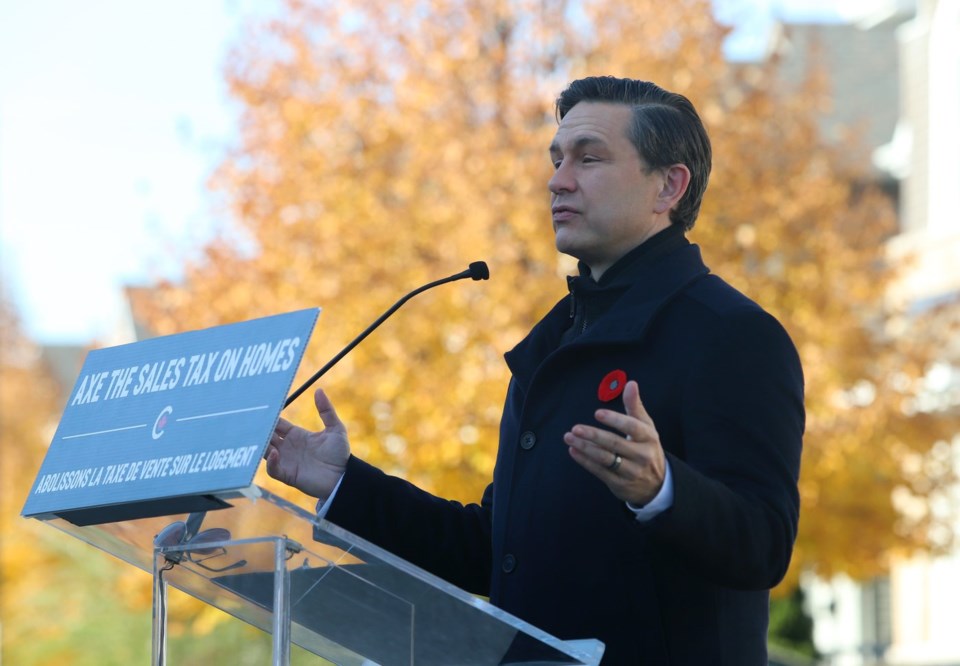OTTAWA — A Conservative government would scrap the federal sales tax on new homes sold for less than $1 million and push provinces to do the same, Pierre Poilievre said Monday.
He made the case for the cut in a six-minute video published online, arguing governments are partly to blame for high home prices because they're charging too much in sales taxes.
"The number 1 cost for a home is government: government bureaucrats, government taxes, government gatekeepers," Poilievre said in a news conference in an Ottawa suburb on Monday morning.
The Conservatives estimate the new measure will reduce the cost of an $800,000 home by $40,000 and spur construction of another 30,000 homes per year.
Since becoming the Conservative leader in September 2022, Poilievre has gone after the Liberal government over the rapid increase in home prices and rents since Trudeau came into power in 2015.
That message appears to have resonated with Canadians who are fed up with the high cost of living.
The Conservatives have enjoyed a double-digit lead in polls for more than a year, putting the Liberals on the defensive.
Poilievre said Monday that he would pay for the tax cut by scrapping Liberal housing policies.
That includes the housing accelerator fund, which offers homebuilding money to cities if they adjust bylaws and regulations that are considered barriers to new construction.
Poilievre said a Tory government would also abolish the housing infrastructure fund, which sets aside $5 billion for agreements with provinces and territories in exchange for adopting certain housing policies.
The Conservatives expect income tax revenues to increase due to the boost in homebuilding spurred by the policy.
"And of course, we're going to get billions of dollars in additional revenue from the fact that construction workers and businesses are making more money building more homes," Poilievre said.
The Liberal government scrapped GST charges on new apartment builds last year to encourage more rental construction, but the NDP and Conservatives said they would only keep that cut for affordable or below-market price rentals.
Housing Minister Sean Fraser criticized the Conservatives' plan to pay for the tax cut by ending existing housing programs that he says are delivering results.
Fraser said recent zoning changes by municipalities have legalized denser homebuilding as a result of the housing accelerator fund and suggested cutting the program would hurt low- and middle-income families.
"It's unacceptable to me to advance a program if the result is going to be that middle-class families and low-income families pay more, if the benefit of the program is then opened up to the investor class who might have five or six homes and suddenly gets a tax cut paid for by ordinary Canadians," he said on Monday.
New policy ideas to tackle the national housing shortage are very welcome, said Josh Morgan, chair of the big city mayors' caucus at the Federation of Canadian Municipalities and the mayor of London, Ont.
But if Poilievre were to abolish the housing accelerator fund and other existing programs, the federal government would need to have a conversation with cities about what would replace it, he said.
"There's a lot of front-end cost to growth that municipalities tend to get on the hook for," he said, but he added that municipalities don't have the revenue to build or maintain infrastructure without support from federal or provincial governments.
If Poilievre's Conservatives were to put a sudden stop to the housing accelerator fund, Morgan said the impact would differ greatly city to city, since each has been using the money in different ways.
In London, the city plans to convert vacant office space into residential units, he said.
Mayors have called for property tax reforms to allow cities to generate more revenue on their own and become less reliant on the government of the day.
This report by The Canadian Press was first published Oct. 28, 2024.
Nojoud Al Mallees and Laura Osman, The Canadian Press

